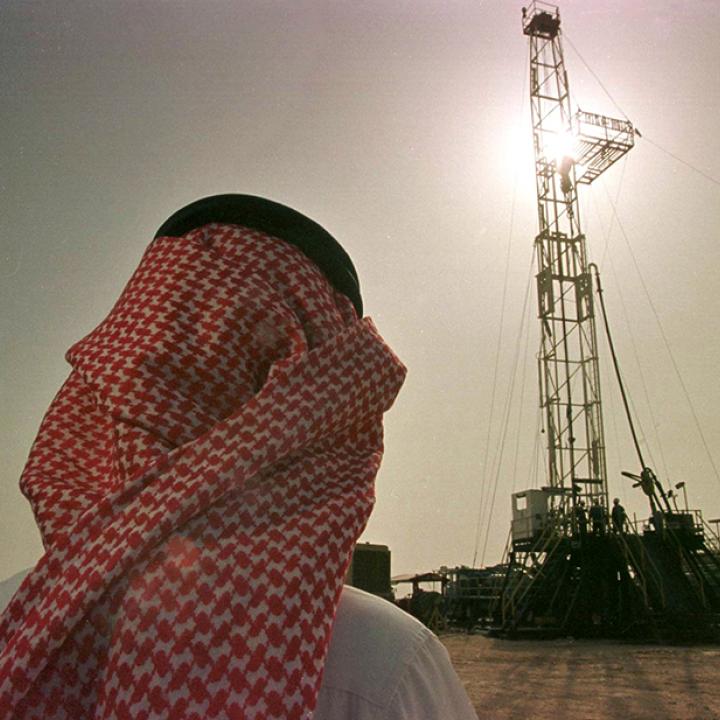
- Policy Analysis
- Policy Alert
Biden Sees Oil as Key to His Visit, but Does Riyadh Agree?

The administration has signaled its intentions for the trip well in advance, but the realities of Saudi oil capacity and global energy forecasts should temper any U.S. expectations of a quick fix.
The centrality of energy security to America’s historical relationship with Saudi Arabia is under strain. When Saddam Hussein invaded Kuwait thirty-two years ago and threatened nearby Saudi oil fields, King Fahd ignored the pleas of cautious senior princes who wanted a delay to discuss the issue and instead requested Washington’s immediate help—which he quickly received in the form of half a million U.S. troops and a multinational force. It was a perfect illustration of the longstanding strategic understanding between the two governments: Saudi Arabia will supply the world with oil, and the United States will defend the House of Saud.
This understanding has mutated somewhat in the decades since then, particularly around the question of keeping oil available to the global community at a reasonable price. Riyadh holds substantial influence over this matter by virtue of having huge reserves and spare capacity, yet its perceptions of “reasonable price” are seldom what consuming countries think, let alone motorists at the pump.
President Biden’s declared aim for this week’s visit was laid out in his July 9 op-ed for the Washington Post. Noting his desire “to strengthen a strategic partnership going forward that’s based on mutual interests and responsibilities,” he then pointed out that Middle East energy resources “are vital for mitigating the impact on global supplies of Russia’s war in Ukraine.” The latter passage was clearly aimed at Saudi Arabia in particular, since no other regional ally has the ability to play such a role.
Given that the agreements announced at top-level diplomatic meetings are usually precooked via hours of staff work and lower-level haggling, some of Washington’s latest messaging suggests that it has not yet extracted Riyadh’s full support on certain matters, particularly Saudi oil market cooperation with Moscow. For example, National Security Advisor Jake Sullivan publicly noted on July 11 that Russia is purchasing drones from Iran for use in Ukraine, and his announcement seemed at least partly directed at Riyadh—perhaps the administration’s way of asking the Saudis why they are expanding their oil transactions with Russia at a time when Moscow is buying weapons from their greatest rival. Although Riyadh has increased its oil exports to a certain degree over the past few months in response to U.S. pressure, its willingness to do so largely stemmed from the availability of heavily discounted Russian fuel oil, which it has been purchasing in much greater amounts for domestic use. As the industry publication MEES commented, “When Western leaders called for [Saudi Arabia] to ramp up supplies, this wasn’t quite the way they were intending it to happen.”
To be sure, the kingdom is not the panacea to the current price spike, at least not by itself. Saudi oil production is currently about 10.5 million barrels per day (b/d), with an additional 1 million available as natural gas liquids. It also has an estimated 1.5 million b/d of spare capacity, making for a theoretical total of 13 million. But even if Riyadh were willing to use all of this capacity—news flash: it isn’t—there would still be doubts about how quickly the extra oil could be brought online and how long it could be sustained.
Despite these limitations, the Saudis could definitely accomplish one thing by increasing production and distancing themselves from fellow OPEC+ member Russia: changing the atmospherics. This in itself would be a significant achievement.
Yet current economic and energy forecasts should temper how much optimism officials decide to express on this front. On July 12, the OPEC cartel (the Saudi-led side of OPEC+) released statistics that anticipate very strong but slow growth in oil consumption based on recovery from the COVID pandemic, downplaying fears of recession. Yet this seems unlikely—as analyst Javier Blas tweeted, “It won’t happen.” The same day as OPEC’s forecast, the head of the Paris-based International Energy Agency, Fatih Birol, warned that shortages in energy supply may intensify, putting further upward pressure on the price of electricity and gasoline: “The world has never witnessed such a major energy crisis in terms of its depth and its complexity. We might not have seen the worst of it yet.”
Helpfully, oil prices weakened this week below the headline figure of $100 per barrel. And whatever else is on President Biden’s agenda during his Saudi visit, this issue will probably generate the greatest interest. Yet any further progress on price and supply questions will necessarily go hand in hand with diplomatic progress between the president and Crown Prince Muhammad bin Salman—the one Saudi whom Biden has been reluctant to meet.
Simon Henderson is the Baker Fellow and director of the Bernstein Program on Gulf and Energy Policy at The Washington Institute.



